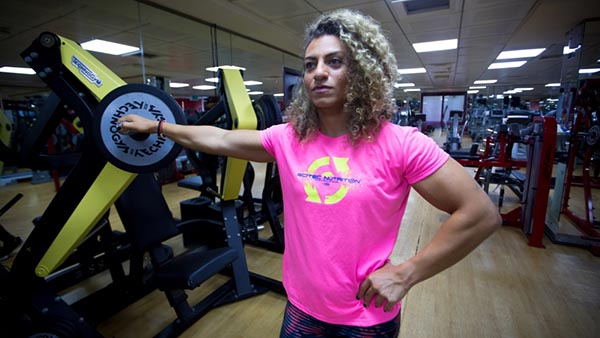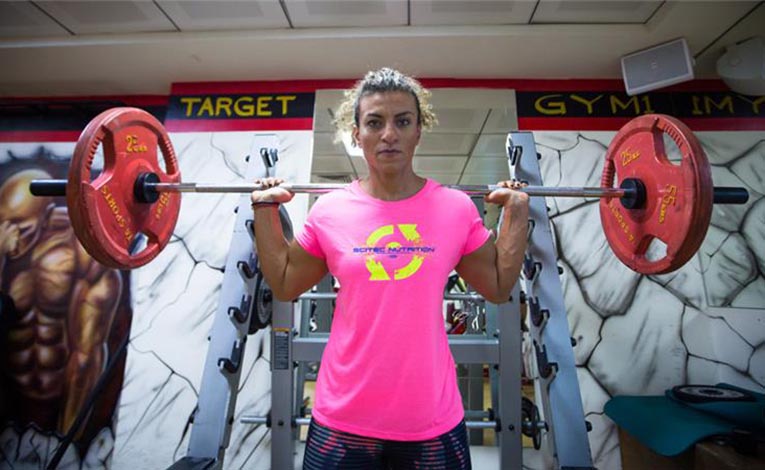Dubai – In 1997, an overweight Bahraini teenager decided she wanted to become a bodybuilder.
Eighteen years later, that young girl, Haifa al-Musawi, is set to become the first woman to represent any Gulf Arab nation in the sport she was inexplicably drawn to at age 14.
“I really wanted [to start bodybuilding] and looking at magazines and seeing it’s possible that women in other parts of the world are doing it… I felt really frustrated because in the back of my mind I wanted it and didn’t know how to get it,” Musawi said.
It has been an arduous journey for Musawi, now 32 years old, who in July was given permission by the Emirates Bodybuilding Federation (EBF), the governing body in her country of residence, to compete for the United Arab Emirates.
“I don’t know if I should cry or smile now,” she said of the news. “Cry because it took me so long, or smile and just be happy about it.”
When interviewed by Al Jazeera the same day she learned of the good news, Musawi was clearly tired; she had just returned from a holiday in Spain, but the exhaustion evident on her face was more than just jetlag.
There have been years of pushing her body to the limit and bureaucratic headaches, trying to find a country that will let her represent it – necessary for the top bodybuilding competitions run by the International Federation of Bodybuilding and Fitness (IFBB).
Several years ago, the Bahraini bodybuilding federation told her while she could “participate”, there was no women’s team to enable her to compete for her native country, of which she remains a citizen.
The worst part, she said, has been the prejudice she has faced in being a woman competing in a predominantly male sport.

“The comments I hear about myself are just awful,” she said. Earlier that morning, an airport employee had insulted Musawi. “[He said] ‘What is that thing’? I’m not a ‘thing’; I’m a human being. It is unbelievable. I have so much faith and confidence, [and] they don’t matter. At the same time, [when] I really think [about] people like this, how can they change the coming generation or make it better?”
By contrast, Musawi said she has found more acceptance of her appearance in Europe, though acknowledged that muscular female athletes like Serena Williams face difficulties wherever they go.
When Musawi finally began training at age 17 to address her weight problem, she was nervous about the reactions she would receive. “[People] were like, ‘That’s weird. Where did that idea come from? We don’t have such a thing here.'”
Her family has been supportive to a point, though they do not like the increasing publicity she has been receiving. And while many of her friends stand behind her, some think it is “too much”.
“At the end of the day, I’m a woman. I want to look like a woman athlete, not a man athlete, and that’s the big misunderstanding,” said the 65kg bodybuilder who eats more than $2,000 of food a month and takes 13 supplements each day.
Childhood friend Mariam al-Hajri, who still lives in Bahrain, remembers visiting Musawi at home, who would often be reading bodybuilding magazines: “She was just so into it and I could see her passion,” she said.
Hajri, who lifts weights and does endurance fitness herself, has a particular sympathy for her longtime friend, having to reassure her own mother that drinking protein shakes would not “turn [her] into a man”.
“I want Haifa to just prove everyone wrong because I can see she’s going somewhere, and maybe she’ll open doors for other girls to come out and do what they like.”
So far, Musawi, who is mentored by Portuguese bodybuilder Andreia Sousa, has only competed once, at an event in Dubai, where she was not required to represent a country. Her sights are currently set on the IFBB World Fitness Championships in Budapest in November, which would mark the first time a woman from a Gulf Arab state has competed under a flag.
Musawi is currently transitioning from the bulkier bodybuilding to the smaller physique category – part of the complex taxonomy under the bodybuilding rubric that includes figure, fitness, and bikini divisions, divided mostly by weight and muscle mass.
But she does not understand why beauty standards matter in society’s acceptance of female athletes.
“Do women bodybuilders have to be attractive to men in order for them to approve this sport? It’s not about being attractive – and I don’t want to look attractive,” Musawi declared.
It is her boldness that EBF Vice President Abdulkarim Saeed believes makes Musawi the perfect poster girl for Arab female bodybuilders. “It’s incredible. She is so courageous to go on stage. It is very rare in Arab countries, but she has different characteristics. She’s a strong lady.”
Saeed is chiefly responsible for arranging Musawi’s UAE representation. He is considered the grandfather of the sport in the UAE, and in the 1970s used to compete alongside his friend Arnold Schwarzenegger.
The federation has seen rapid growth: In 1992, it had just 50 members; now, it has 1,000. Although Musawi is the first female member, Saeed estimates there are more than 100 other Emirati women who are also doing bodybuilding training.
“Our women are shy; they don’t want to come on the stage. They do this training, but they do it for themselves.”
But he is hoping that will change. “Tomorrow you’ll find [Musawi] is one; in a year, you’ll find three or four.”
Courtesy of: Aljazeera
